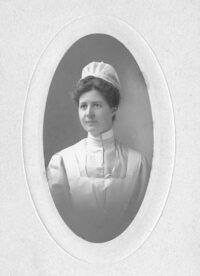Vashti Bartlett Collection

Vashti Bartlett
by unidentified photographer
Collection Overview
Creator: Bartlett, Vashti (1873 - 1969)
Collection Date: 1885 - 1969
Extent: 6.6 cubic feet (18 boxes)
Biography
Vashti Rebecca Bartlett was born in Maryland on November 15, 1873. Her father’s family had been active in business and civic affairs, and her grandfather had been a director of the Baltimore and Ohio Railroad. She was educated at Bryn Mawr School in Baltimore and completed her education while traveling with her family in Europe.
Bartlett graduated from the Johns Hopkins Hospital Training School for Nurses in 1906. Her nursing career took her around the world. She first combined nursing with travel in 1908 through her work as Chief Nurse at St. Anthony Hospital, part of Dr. Wilfred Grenfell’s Royal National Mission to Deep Sea Fishermen in Labrador and Newfoundland, Canada. From 1909 to 1914 she worked as a nurse in the United States, including as the Superintendent of Nurses at Watts Hospital in Durham, North Carolina, and at Church Home and Infirmary in Baltimore. She serviced with the American Red Cross during World War I. From March 1915 to January 1916, she was head nurse and supervisor of nurses at American Red Cross hospitals in Pau, France and La Panne, Belgium. After returning to the United States, she served as Clara Noyes’ assistant at Red Cross headquarters in Washington DC until August 1918. She then entered the Army Nursing Corps as Chief Nurse of Base Hospital Unit 71 in France and served until April 1919.
Scope and Content
The Vashti Bartlett Collection focuses on her education and her nursing career. The collection includes biographical material, correspondence, diaries, student notebooks and teaching materials, publications, photographs, and material evidence. It includes student notebooks from her secondary education at Bryn Mawr School in Baltimore and from her nurses training at Johns Hopkins Training School for Nurses. It documents her nursing service in the United States and around the world. During the course of her career she served for brief periods as a community and public health nurse, a disaster relief nurse, a superintendent at schools of nursing, a supervisor of nurses during wartime, and a nurse educator. During World War I, she wrote extensively to family members and friends about the conditions of the war and documented this further with an extensive photograph collection. Her journal and photographs from Siberia provide a first-hand view of the medical conditions, as well as the unstable political situation. This was a time of severe political instability with soldiers from Czechoslovakia, Japan, and the United States, as well as from various Russian factions, such as the Bolsheviks and White Russian Kolchak government, trying to maintain order and establish control of the Trans-Siberian Railroad. The resulting refugees and orphans required nursing and medical attention. Her journals, letters and photographs from Haiti document her struggle to improve the training of her nursing students in the midst of the smallpox epidemic.
